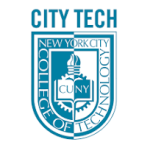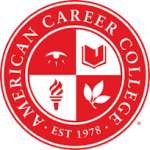Although opticians wear many hats, their primary goal is to address clients’ eyewear needs, including adjusting and fitting based on prescriptions, preparing eyewear, and providing customer service to those seeking contacts or glasses.
Additional tasks include maintaining inventory, keeping sales records, and educating customers about eyewear issues.
Opticians commonly work in healthcare offices but could also run an optical business.
Specific steps must be followed to become an optician.
Keep reading to learn more!
Steps to Become an Optician
Step One: Formal Training
Optician training is available through associate degree and certificate programs.
Most training programs require a high school diploma and students at least 18 years old.
Technical schools and community colleges most commonly offer formal training at the associate and certificate levels.
Budding opticians can expect an associate degree to take around two years due to the general education classes and more in-depth information about the field, while a certificate program takes approximately one year.
The most common optician courses include the following:
- Eye physiology
- Laboratory sessions
- Lens technology
- Ophthalmic dispensing
- Optical theory
Before enrolling in a program, it’s crucial to ensure its Commission on Opticianry Accreditation-accredited for the highest educational quality.
Also, the best programs require internship experience to help students build essential job skills and gain firsthand field experience.
During the internship, students can expect to adjust frames and measure customers’ eyes while gaining valuable office management practices.
Many graduates opt for a two-year apprenticeship with a practicing optician to build valuable skills and knowledge.
However, this is not a requirement to start your career.
Step Two: Certification
The ABO-NCLE (American Board of Opticianry & National Contact Lens Examiners) offers three certification levels: basic, advanced, and master.
A series of exams that validate your knowledge and skills must be completed to earn different certifications.
These exams also confirm practical skills.
Step Three: Licensure
Approximately half of U.S. states require licensure to practice as an optician, but they are not uniform.
Licensing requirements could require passing a practical exam at the state level or earning additional credentials through the ABO-NCLE.
Many states use the ABO-NCLE certification exams to grant licensure, while others have state-administered examinations.
For the most accurate information, it’s important to contact the opticianry licensing board in your state.
Some opticians get certified through the NOCE exam which is known to be quite difficult.
Step Four: Maintaining your Credentials
ABO-NCLE credentials require candidates to renew every three years before the expiry date.
Like in most medical fields, renewal also requires continuing education credits to be completed within the current certification period.
Depending on state requirements, those who do not complete the credits or renew before the expiry date could risk losing their licensure and ability to practice.
Licensing Requirements to Become an Optician
State licensing requirements vary, with some states having state-specific exams that must be completed and others utilizing the national examinations.
To become a licensed optician, a training program is strongly recommended because it prepares students for the examination offered by the National Contact Lens Examiners or the American Board of Opticianry.
There are many pros and cons to being an optician.
Online Training Programs
No completely online training programs exist for budding opticians because a laboratory component is required, but hybrid programs are available.
Several of the top U.S. online optician training programs include the following:
American Career College
The American Career College in Los Angeles offers an Optical Technician program that is available at several locations around the area, including in Los Angeles and Long Beach.
Canadian students can access the program from the school’s Ontario Campus.
Program graduates are prepared for entry-level positions at:
- Ophthalmologist practices
- Private optometrist offices
- Vision care centers.
ACC opened 35 years ago and boasts 13 healthcare programs, including the Optical Technician offering.
Benjamin Franklin Institute of Technology
The Boston Benjamin Franklin Institute of Technology is the only optician degree program in the state.
Graduates of the Associate of Applied Science degree in Opticianry have an impressive 99.5 percent job placement rate within the field.
The curriculum allows students to access the updated, best-quality optician equipment.
Program graduates can also utilize the hardware for vision care continuing education credits and research.

Broward College
Budding opticians attending Broward College in Fort Lauderdale, Florida, can earn an Associate of Science in Vision Care Technology.
Attendees have access to Broward’s Vision Center, boasting the latest equipment and technology.
The program is Commission on Opticianry Accreditation (COA)-accredited and requires an 18-month commitment.
The school holds a monthly information session at the North campus for those interested in learning more about the program.

CSN
This Las Vegas-based school offers four Ophthalmic Technology Program paths, including:
- Associate of Applied Science in Ophthalmic Dispensing – approximately two years to complete.
- Contact Lens Technician certification – 11 credits.
- Ophthalmic Dispensing certificate for Registered Apprentices – 26 credits.
- Ophthalmic Laboratory Technician certificate – 10 credits.
The school boasts nine learning centers and three primary campuses across the State.

City Tech CUNY
The Ophthalmic Dispensing Associate degree offered by the New York City College of Technology comprises laboratory sessions and classroom instruction on theory.
This location boasts state-of-the-art ophthalmic facilities, including a dispensing clinic, contact lens clinic, and laboratories.
Actual patients visit the clinic to give students first-hand experience.
The faculty is accredited opticians who have earned advanced degrees in the field.
Program graduates are eligible to take the state and national certification and licensure examinations.

Durham Tech
Durham Tech’s Opticianry Department offers an Optical Apprentice Certificate and Associate Degree hybrid program, combining online classroom instruction with in-person lab work.
The certificate program requires six classes to graduate and was designed to align with North Carolina’s apprenticeship program.
Both programs are approved by the North Carolina State Board of Opticians and accredited by the COA.

Erie Community College
ECC’s North Campus offers an Associate in Applied Science in Vision Care Technology degree.
The program comprises laboratory and classroom instruction and clinical externships available at 70 approved Western New York vision care centers.
During the program’s second year, students work at a local community eye clinic under professional supervision.
This program is accredited by the Commission on Opticianry Accreditation.

Miami Dade College
Miami Dade College boasts an Associate of Science Degree in Opticianry, preparing students to be licensed in Florida.
Lecture courses are offered online, while the remaining curriculum must be taken at the school’s medical campus.
The program is available for part-time and full-time students, with the full-time option taking around two years to complete.
Applications are only available for completion in person at the campus, which is a good opportunity to meet with the career counselors regarding your future.

Ogeechee Technical College
Georgia’s Ogeechee Technical College offers an Opticianry Diploma, requiring a one-year time commitment, and an Associate of Applied Science in Opticianry, which requires two years.
Both programs focus on preparing graduates to become licensed dispensing opticians, with the associate degree program being more comprehensive and having more general education.
Also, each program allows graduates to sit for the certification exams, which must be passed to practice in Georgia.
Graduates hold an impressive 95 percent job placement and 100% Georgia state board passing rating.

Tamu Texarkana
Texas A&M at Texarkana boasts an Ophthalmic Assistant/Optician program available in 10- and 15-week increments.
The program requires 80 hours, with 20 in clinical practice at the Texarkana Eye Associates facility and the other 60 in classroom lectures.
The end of the program requires a comprehensive final that results in a certificate of completion and the ability to sit for the Certified Ophthalmic Assistant exam.
This program is a non-credit certification but prepares students for entry-level positions.
Here’s a more comprehensive list of online training programs for opticians.
Salary
The average U.S. optician salary is $31,214 per year.
The Bureau of Labor Statistics expects the optician field to grow by six percent from 2020 to 2030, with approximately 5,900 new openings every year, an average rate among all occupations.








